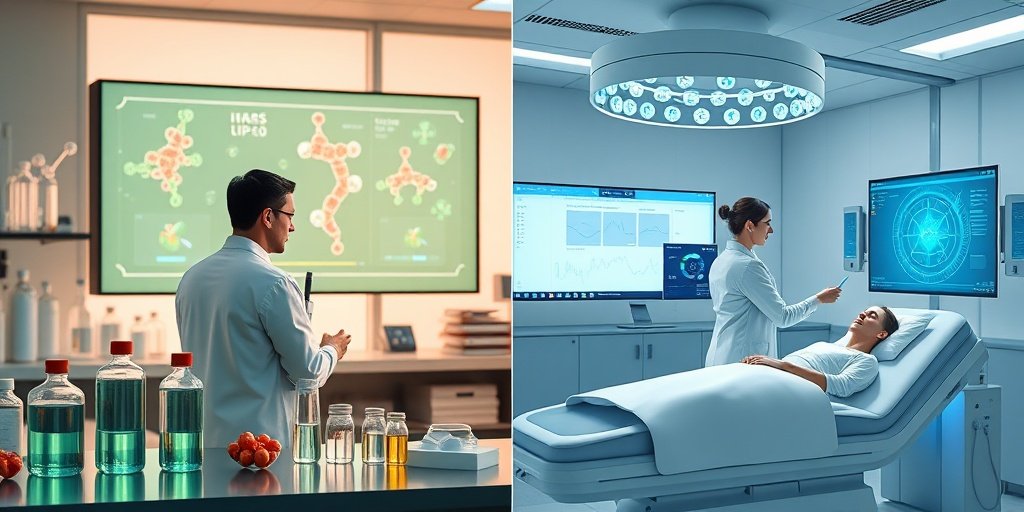⚡ Quick Summary
This review highlights the technological advancements in antibody-based therapeutics, showcasing the evolution from traditional monoclonal antibodies (mAbs) to innovative modalities like antibody-drug conjugates (ADCs) and CAR-T cell therapies. With 144 FDA-approved antibody drugs and over 1,516 candidates in clinical development, the field is rapidly expanding, promising to address significant clinical needs.
🔍 Key Details
- 📊 FDA Approvals: 144 antibody drugs approved as of August 2025
- 🌍 Global Candidates: 1,516 antibody candidates in clinical development
- ⚙️ Technologies: Hybridoma technology, phage display, transgenic mouse platforms
- 💡 New Modalities: ADCs, bispecific antibodies (bsAbs), CAR-T cell therapies
- 📈 Market Growth: Global sales of antibody-based therapeutics exceeded USD 267 billion in 2024
🔑 Key Takeaways
- 🔬 Monoclonal antibodies (mAbs) are pivotal in treating various diseases, including cancer and autoimmune disorders.
- 🚀 Engineering breakthroughs have led to enhanced specificity, potency, and safety of mAbs.
- 🤖 AI and machine learning are accelerating antibody discovery and design processes.
- 📦 Innovative delivery strategies like mRNA-lipid nanoparticles are improving therapeutic precision.
- 🌟 The integration of biology and informatics is shaping the future of antibody-based medicine.
- 🩺 Antibody-based therapies are becoming essential in addressing unmet clinical needs globally.
- 📈 The market for antibody therapeutics is experiencing rapid growth, reflecting their clinical significance.

📚 Background
Since the introduction of hybridoma technology in 1975, the field of antibody-based therapeutics has undergone remarkable transformations. Monoclonal antibodies (mAbs) have emerged as a cornerstone in the treatment of various diseases, including oncology, immunology, and infectious diseases. The continuous evolution of technologies has paved the way for more effective and safer therapeutic options, addressing critical healthcare challenges.
🗒️ Study
This review article provides a comprehensive update on the advancements in antibody discovery platforms and therapeutic formats. It discusses the integration of cutting-edge technologies such as next-generation sequencing (NGS) and structural modeling tools, which have significantly enhanced the efficiency of antibody design and development. The authors also explore the regulatory landscapes and clinical translation of these innovations.
📈 Results
The review highlights that as of August 2025, there are 144 FDA-approved antibody drugs and 1,516 candidates in clinical development. The advancements in engineering have led to the emergence of new therapeutic modalities, including ADCs and CAR-T cell therapies, which have shown promising results across various disease domains. The integration of AI and ML has further accelerated the discovery and optimization of antibodies, enhancing their therapeutic potential.
🌍 Impact and Implications
The rapid advancements in antibody technology are reshaping the landscape of medicine. With global sales of antibody-based therapeutics exceeding USD 267 billion in 2024, these therapies are becoming increasingly vital in addressing unmet clinical needs. The integration of innovative delivery strategies and AI-driven design processes holds the promise of more precise and effective treatments, ultimately improving patient outcomes and healthcare delivery worldwide.
🔮 Conclusion
The future of antibody-based therapeutics is bright, driven by continuous technological advancements and a multidisciplinary approach. As the field evolves, it is poised to tackle significant healthcare challenges and improve the quality of life for patients globally. Ongoing research and collaboration across engineering, biology, and informatics will be crucial in realizing the full potential of these innovative therapies.
💬 Your comments
What are your thoughts on the advancements in antibody-based therapeutics? We would love to hear your insights! 💬 Leave your comments below or connect with us on social media:
Technological advancements in antibody-based therapeutics for treatment of diseases.
Abstract
Monoclonal antibodies (mAbs) represent a major class of therapeutics with widespread clinical applications in oncology, immunology, hematology, neurology and infectious disease. Since the introduction of hybridoma technology in 1975, the field has been advanced by a succession of innovations including chimeric and humanized antibody engineering, phage display, transgenic mouse platforms and high-throughput single B cell isolation. These technological developments have enhanced the specificity, potency and safety of mAbs, resulting in 144 FDA-approved antibody drugs on the market and 1,516 worldwide candidates in clinical development as of August 2025. Engineering breakthroughs have led to new modalities of antibody-based therapeutics, such as antibody-drug conjugates (ADCs), bispecific antibodies (bsAbs), and chimeric antigen receptor T (CAR-T) cell therapies. Each of these modalities has therapeutic utility across multiple disease domains. Recent advances in delivery strategies, notably mRNA-lipid nanoparticles (LNPs) and antibody-directed in vivo CAR-T cell reprogramming, can enable precision therapies while reducing off-target effects and manufacturing complexity. The integration of artificial intelligence (AI) and machine learning (ML), next-generation sequencing (NGS), and structural modeling tools has further accelerated antibody discovery, affinity maturation and immunogenicity prediction, allowing for more efficient and rational antibody design. The advances in antibody technology are reflected in the rapid market growth of antibody-based therapeutics, which had global sales exceeding USD 267 billion in 2024. This review provides a comprehensive update on recent developments in antibody discovery platforms, therapeutic formats and market trends, highlighting emerging strategies that are reshaping the landscape of antibody-based medicine. Furthermore, we discuss clinical translation, regulatory landscapes, and the integration of engineering, biology and informatics. Together, these aspects shape a dynamic and multidisciplinary future for the therapeutic antibody field, which is poised to address unmet clinical needs and global healthcare priorities.
Author: [‘Lu RM’, ‘Chiang HL’, ‘Yuan JP’, ‘Wang HH’, ‘Chen CY’, ‘Panda SS’, ‘Liang KH’, ‘Peng HP’, ‘Ko SH’, ‘Hsu HJ’, ‘Kumari M’, ‘Su YJ’, ‘Tse YT’, ‘Chou NL’, ‘Wu HC’]
Journal: J Biomed Sci
Citation: Lu RM, et al. Technological advancements in antibody-based therapeutics for treatment of diseases. Technological advancements in antibody-based therapeutics for treatment of diseases. 2025; 32:98. doi: 10.1186/s12929-025-01190-2